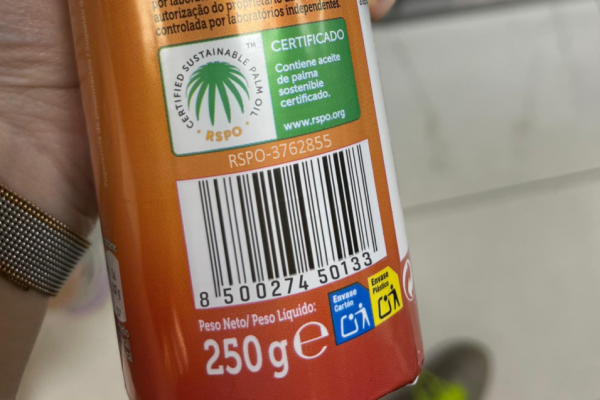Last month saw hundreds of stakeholders from Europe and around the world convene for the third annual Sustainable Palm Oil Dialogue.
The virtual event, lasting three days, was hosted by The European Palm Oil Alliance and IDH (the Sustainable Trade Initiative) and sponsored by the Roundtable on Sustainable Palm Oil and the CGF Forest Positive Coalition of Action.
Panels comprised of leading experts engaged hundreds of stakeholders in Europe and beyond focussing on three themes: crucial action to make sustainable palm oil the norm, driving positive social impact and accelerating forest positive action. The sharing of developments, impacts and ideas resulted inspirational discourse about the way forward.
Lessons From The Sessions
Beyond the 2020 Milestone: Crucial Actions To Make Sustainable Palm Oil The Norm
Despite the COVID crisis, there is a strong commitment in the EU market for the usage of sustainable palm oil for food, feed and oleochemicals remaining stable at 90% in 2020. Private sector actors are taking steps beyond CSPO purchasing towards sustainability, such as through improving traceability and having NDPE policies which look into the drivers of problems.
To meet the challenge of closing the gap to reach 100%, Daan Wensing, chief executive at IDH encourages all stakeholders to act collectively, pointing out that with the solutions, network and supply that are there, ”there is no excuse NOT to act.”
European supermarkets should be aware of mandatory due diligence legislation being proposed in the EU, with the objective of minimising the bloc's contribution to deforestation and forest degradation worldwide.
The new EU Forest Partnerships, targeting six key commodities (palm oil, soy, wood, beef, cocoa, coffee), will move the focus from legality to a more holistic and integrated approach which includes sustainability criteria for deforestation-free supply chains. It will be based on scientific evidence, non-discriminatory, and implementable in practice. Five priority areas in the proposed legislation are:
- Sustainable supply chains: demand side
- Sustainable supply chains: supply side
- International cooperation
- Finance and investments
- Research, transparency and traceability
Driving Positive Social Impact In The Palm Oil Sector
Challenges faced by workers in the palm oil sector include lack of freedom of association and collective bargaining, lack of independent unions and few opportunities to conduct social dialogue and negotiate Collective Bargaining Agreements.
To address these issues, CNV Internationaal have launched a roadmap and call to action on creating an alliance for change through social dialogue. The roadmap offers a step-by-step approach to help stakeholders, including buyers, to collaborate with workers to help unions to reach sustainable change.
“If we want to achieve a vision of a holistic sustainable palm oil value chain, we must apply a socio-economic lens to it," says Ruben Brunsveld, from the Roundtable on Sustainable Palm Oil.
Palm oil production zones overlap with areas of the highest poverty levels globally; this provides high potential for positive social impact. Members of the RSPO deliver positive social impact by supporting human and labour rights, decent living wage and gender inclusivity, and also via smallholder inclusion.
Retailers are encouraged to be active members of RSPO to help further strengthen social criteria, and to create positive impact in their sphere of influence.
Positive social impact can be delivered when companies focus on engagement and concrete actions on the ground in collaboration with suppliers to address systemic social impact risks. Companies cannot solve social issues in isolation. The way forward is through partnerships with the industry, suppliers and NGOs committed to continuous improvement in order to achieve change.
Accelerating Forest Positive Action In Palm Oil Sector
To accelerate forest positive action, companies in the EU and globally need to translate their commitments in sustainable sourcing to action on the ground.
By identifying key best practices and the biggest priorities to eliminate deforestation in the sector and then building scalable solutions such as smart technologies, and wider access to information on fire prevention, sustainability and forest protection, value chain stakeholders can make a difference.
In order to move from deforestation-free businesses to forest positive businesses, retailers are encouraged to become involved in the Forest Positive Coalition of the Consumer Goods Forum and to commit to follow the roadmaps for key commodities including palm oil. These roadmaps have been created to guide the transformation needed to implement and practice forest positive production.
The Forest Positive Coalition’s Palm Oil Roadmap addresses companies’ own supply chains, suppliers and traders, monitoring and response, landscapes, transparency and accountability.
“The CGF Forest Positive Coalition was a proud sponsor of this year’s Sustainable Palm Oil Dialogue - Europe," commented Didier Bergeret, director of sustainability, The Consumer Goods Forum.
"Our Palm Oil Roadmap outlines how businesses can act to remove deforestation and conversion from their palm oil supply chains, but individual company action is not enough. We all have a role to play to end deforestation in the palm oil sector, and SPOD presents a positive opportunity for actors from both producing and consuming countries to engage in critical dialogues."
Key Takeaways
While declining trends of deforestation in palm oil are encouraging, challenges remain and companies, governments and NGOs all have a role in making the palm oil sector truly forest positive. The work done in jurisdictional approaches bringing together all relevant stakeholders, including government, at sub-national level proves instrumental.
Scaling up landscape approaches, with open and constructive collaboration on the ground (involving all key stakeholders including market partners), is key to forest positive and also positive livelihood change. It is clear that deforestation cannot be addressed without discussing smallholder inclusion, market uptake, and social impact.
All parties in the value chain have the shared responsibility to protect and restore forests, bring biodiversity back, as well as make workers, farmers and communities thrive. By bringing the public and private sector together to share diverse knowledge, the industry can find a way forward and make impact at scale.
© 2021 European Supermarket Magazine. Article by Sustainable Palm Oil Dialogue. For more Supply Chain news, click here. Click subscribe to sign up to ESM: European Supermarket Magazine.














